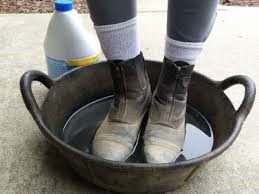Worried about Infection Control and Prevention in Your Barn?
Keeping Your Horse Healthy
Infection Control and Prevention in Your Barn
- Prevention

- Clean equipment between horses (bits, halters, twitches etc)
- Avoid shared water sources
- Wash hands regularly or use hand sanitizer
- Have designated barn boots that are cleaned regularly
- Vaccinate against influenza and herpes viruses routinely
- Isolate new or competing horses for two weeks

2. Observe Daily
- DEPP: Drinking, Eating, Pooping, Peeing: know what is normal for your horse so you can intervene early
- Watch for signs of infection: coughing, runny nose, loose stool and low energy
- Temperature: take your horse’s temperature if these signs occur. Normal temperature is 98.0-101.5.
3. Initiate Sick Horse Biosecurity Measures
- Isolate horse in separate barn or stall away from other horses

- Place signs: inform others so they can take precautions to decrease the spread of infection
- Equipment: label buckets, shovels and tack just to be used with that horse
- Work with sick horse last
- Hands: wear gloves or wash hands after handling horse
- Feet: wear shoe covers or set up a foot bath outside of stall
4.Contact the Veterinarian
- Depending on the situation may recommend diagnostics, treatments and further advice on monitoring and biosecurity measures.

5.Clean up
- Keep horse isolated and at home for 28 days
- Manure/bedding: place in manure bin to compost before spreading or place in compost container that is commercially removed
- Disinfect: clean equipment and stall with a detergent followed by a disinfectant


